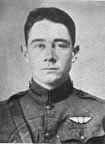


|
(STANFORD UNIVERSITY) OF ARTHUR CLIFFORD KIMBER WHO SHARED WITH HIM THE JOY AND VISION OF COLLEGE DAYS AND THE FRIENDS WHO HEARD WITH HIM THE CRY OF AGONY AND THE CALL OF DUTY AND WHO PLACED ALL THAT LIFE HOLDS DEAR UPON THE ALTAR OF SERVICE FOR COUNTRY AND HUMANITY |
IF it were not that he did what he wanted to do, and accomplished that which was dearest to his heart, nothing could reconcile me to the death of my son, who was to me all that a mother's heart could desire.
When I stood upon the pier in New York that bright day in mid-May, and watched the quiet figure standing aloof on the deck of the "St. Louis," the flag, sheathed in its long black case, in his hand, I wondered even then what would be my feelings the day he returned. That day, his face now growing dimmer and more indistinct as the ship became a mere speck in the distance, would come closer and closer, and his eager eyes fixed on me would be clearly discernible.
I thought he would come back. He took the flag and went away. It is a sad and weary world, but I am not alone. Other mothers have the same sorrow, and our homes have been spared the tragedies of many French and Belgian families.
To other bereaved families I can only say, let us look forward to going to them, since they will not come back to us. Many of Clifford's friends are with him now, and I know they are happy. This flag which he carried to France is now reposing in the Memorial Church of Stanford University, and this book is to remind me that the flag, like the principle back of Clifford's life as a whole, is imperishable, and represents the soul of liberty and humanity.
Some day his book of letters will be published. We are told by returning aviators who lived at the front with Clifford, and fought beside him in the air, that during the last few weeks of his life he never spoke of himself, and, although cheerful, was continually silent. Many things have proved to me that he knew he was destined to go to a new Commanding Officer, and a larger field of action, and he grimly went forward to meet his destiny. If he did not talk to his comrades, he poured out his heart in his letters to his mother and brothers, and we feel that we journeyed with him to the end.
C. E. K.
PALO ALTO, CALIFORNIA
OCTOBER 22, 1919
THE story in this little volume is one which will stir the heart of any American, but for us who belong to Trinity Parish it has a special message.
Arthur Clifford Kimber, born in Bayville, Long Island, March 29, 1896, was one of our own boys, a child of the parish, and of the Church in the fullest sense. He lived and grew up among us. His father was for thirty-seven years in charge of St. Augustine's, one of our missionary chapels, where he did heroic work among the people of the lower East Side.
To us who knew Clifford well, and who knew also the mother who imparted her own spirit to the sons left early in her sole care, it seemed quite natural that this strong, quiet noble-hearted boy should come from his new home in California, chosen by his comrades of Stanford University to be the bearer of the first American flag officially carried to the front. We were proud of the honor shown him, and we were proud, as he was also, for the flag to rest for a few hours in his home church of Old Trinity. It stood before the altar during the services on Sunday, it was solemnly blessed to its sacred purpose, and it was viewed with unconcealed emotion by large numbers of people who saw in it the symbol of America's espousal at last of the great cause to which she was called, and to which this young bearer of her standard was to give his life. There was complete accord between the symbol and the spirit of him who bore it. It was souls like that of Clifford Kimber which made victory in this war a certainty, and it is souls like his which carry the world forward and upward. We shall always be glad that he rested with us that day at Trinity Church. He gave his life willingly for God and country, a true soldier of the cross standing not for "peace at any price" but for righteousness at any cost.
We give thanks for his high example, and that of the others like him whom we keep in loving remembrance. May God bless and reward him and them in the other life where they now live and continue their faithful service.
|
He was a star? No, never so remote. Then came the call. The early sun |
|
|
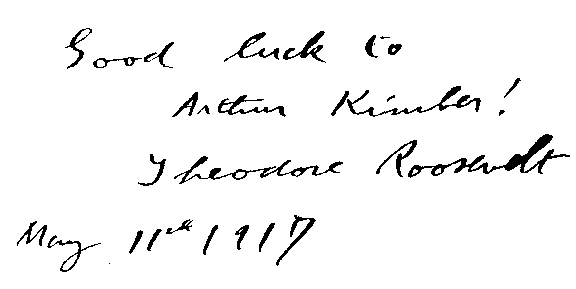
ON TUESDAY, April 24, 1917, the Friends of France, in co-operation with the recently organized American League of California, wrote, at the Civic Auditorium in San Francisco, a significant chapter in the spiritual history of the city.
Between the hours of 4 and 6 on the afternoon of the day mentioned, over twelve thousand persons participated in the "Leave-Taking" tendered by the two societies to forty-two students from the University of California and twenty-one from Stanford University who had volunteered for service in the American Ambulance in France. The young men were presented with brassards, bearing the insignia of the society, by the Friends of France, and four American flags---the gift of the American League of California, to be taken by the volunteers under service and with the authority of the War Department to the battle fronts of Europe---were solemnly and ceremoniously dedicated.
The event was significant and impressive. The march from the Ferry of twenty-five hundred Berkeley students (of whom fifteen hundred were uniformed cadets, ordered out for the occasion), one thousand from Stanford, and detachments from the United States Army and Navy; the ringing words of the speakers at the mass-meeting; the cheers that greeted them; the singing of national anthems by thousands of voices---these bore indisputable evidence that public feeling had been aroused.
Whether consciously or unconsciously, the audience felt that behind the ceremonies lay a great idea---the idea of Liberty! The flags, the strains of "America," of "The Marseillaise," and of "The Star-Spangled Banner" were but symbols of that idea. And the sixty-three young men on the platform---young Americans about to leave their homes and their country on a mission of mercy, to serve Humanity by succoring those who shed their blood for Humanity---they, too, were symbols of Liberty, and they were about to take up their service---in France!
Service for Humanity---in France! France, wherein the world has seen the ideal of democracy nourished and made strong; France, wherein the world has seen civilization attain to perfect flowering; France, upholding before the world honor and justice and giving to the world beauty; France, with her courage and endurance, too sublime to be affronted by praise; France, with her vision, her adaptability , her efficiency, vitalized by the strength, the dignity, and the graces of her splendid intellectual heritage! When, therefore, in that hour of sober exaltation we were stirred by a sense of the high purposes that have been voiced in unison by the civilized peoples of the world, we were thrilled not only with pride in America---who, breaking at last her long and patient silence, has so nobly spoken---but with pride in beholding our nation standing by the side of France, valiant, resolute, invincible in her glorious wrath! And so, when M. Neltner, the French consul-general, was introduced, the great audience rose with one accord and shouted its acclaim of the representative of France. This tribute, while it honored the consul-general, was yet uttered from the hearts of the people as a homage to France itself, a homage cried across land and sea to the anguished but proud mother of the bravest men and women on earth.
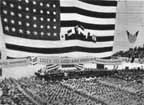
The speakers were Dr. David P. Barrows, dean of the faculties of the University of California, presiding; James Rolph, Jr., mayor of the City and County of San Francisco; Arthur Arlett, president of the State Board of Harbor Commissioners, representing His Excellency the Governor of California; Julien Neltner, consul-general of France; Mrs. Herbert Hoover; Brigadier General C. A. Woodruff, U. S. A.; Dr. Ray Lyman Wilbur, president of Stanford University, chairman of the American League of California; John Herbert Brown, of the University of California Volunteers; LeRoy Farnham Krusi, of the University of California Volunteers; W. B. Bourn, president of the Friends of France; Bruce Porter, vice-president of the Friends of France; Pere Thiery, of the Church of Notre Dame des Victoires; Charles Mills Gayley, Professor of the English Language and Literature at the University of California; Rev. Walter H. Cambridge, rector of the Church of St. Matthew, San Mateo; and Brigadier General W. L. Sibert, U. S. A.
The words of Mr. W. B. Bourn, president of the Friends of France, were as follows:
"The greater battle has been fought. The victory is won. The soul of America is triumphant.
"On the 2d of April, through the immortal words of our President, the nation spoke, and the heart of every true American found peace.
"You carry to France the flag of our country---for our country---for Humanity.
"Our flag, the flags of heroic France, of martyred Belgium, of dauntless Britain can not be furled until liberty, honor, and justice are made the law of mankind, for to that cause is dedicated 'everything that we are, everything that we have.' We have outsoared the thought of self. Victory is God's!"
Striking still a different note, which had its own peculiar response, Mr. Bruce Porter, vice-president and founder of the Friends of France, said:
"We who, through this terrible night, have kept our eyes fixed upon noble France, as the very day star of the world's hopes, have lived to see the dawn breaking in the east and Russia free of her oppressors. Now, only as we, the children of America, each in his deepest heart, realize the glory of our mother in her great unselfish dedication, will she be the noblest, the most unselfish, the most glorious of all---America---the splendid daylight flooding the New World of 'Humanity and the Humanities'!"
When the brassards had been given to the volunteers, Père Thiery, of the French Church, delivered the following benediction:
"O God, whose ways are inscrutable but always wise and just: Thou, who knowest how to bring good out of evil, we thank Thee for giving inspiration to these young men to spend themselves whole and entire in the cause of suffering humanity. Deign, O Lord, we beseech Thee, to bless this generosity. Make these soldiers of charity, gentle, patient, forbearing amid the bloody scenes of the battle-field; fill their hearts with compassion for hearts that are in anguish and desolation: drive far from their hearts any notions of hatred. May their example, yea, their very presence, add new energy to those who are battling for the true, the right, the just: may they return with deep gratitude to Thee, O God, who hast made them realize more and more, from what they have actually witnessed, that it is well worth while for men to sacrifice everything, even their lives, in the cause of liberty, truth and justice: and that only under Thy guidance, in conformity with these principles, can the progress and happiness of the human race be accomplished: chastened, broadened, more ennobled by their experience, may they return safe to their own beloved parents, and be ever the glory and pride of this great republic. Amen."
Then, to the music of fife and drum, the banners of the Allies were carried up the aisles by Boy Scouts; the martyr nations and the champion nations side by side---Belgium and Serbia beside France and England, Italy, Japan, Portugal.
Professor Charles Mills Gayley presented the American flags to the volunteers. The following dedication of the flags was then pronounced by Rev. Walter Cambridge:
"O Almighty God, who has made of one blood all nations of men, and ordained that in Thy service all shall be free, we give Thee thanks for the freedom which our fathers wrought out in righteousness and preserved to us with their blood; the freedom of which they made the flag of our country the symbol. Grant us now Thy favor, as we bless in Thy name these emblems of our liberty. Unfurled in foreign lands, may they witness there that our faltering and neglect are ended, and so mightily renew the courage of those who are our allies in the service of humanity. And to this end, accept us, O Lord, as in the presence of these colors we renew our solemn purpose to preserve for ourselves and for our children the spirit of those who founded our institutions, as we dedicate ourselves to the effort which is to make our flag everywhere respected as the symbol of power devoted to the service of righteousness and justice and freedom. Grant this, we pray Thee, in the name of Christ. Amen."
The flags were accepted for the volunteers, with military honors, by Brigadier General W. L. Sibert. The ceremonies ended with the singing of "The Star-Spangled Banner."
ALTHOUGH at the time the Dedication took place the United States had entered the war, it would be some time before there would be any American soldiers at the front carrying the American flag. It was decided, therefore, to obtain a Government authorization for the flags presented to the American volunteers serving or about to serve with the American Ambulance organization attached to the French Army. A request for such authorization was accordingly made by the American League of California, in response to which a letter was received from the Secretary of War, officially designating the flags presented by the League as the first to be sanctioned by the Government representing the United States.
Of the four flags dedicated at the Auditorium one was destined for the First Stanford Unit of the American Ambulance Field Service, which was already in service in France, having left for the front in February. In order that this unit, being the first to serve, should have the honor of unfurling at the front the first officially authorized flag, the Second Stanford Unit decided to send the flag of the First Unit in advance, and conferred upon one of its members, Arthur Clifford Kimber, the honor and responsibility of carrying it from the United States to France. The appointment was accompanied by the following letter:
Mr. Arthur C. Kimber,
Palo Alto, California.DEAR MR. KIMBER:
In entrusting to you the care and delivery of the official flag to be sent to the First Stanford Unit of the American Ambulance Field Service, we feel certain that the mission will be safely executed.
It was the wish of the Friends of France that this flag be publicly presented to the representatives of the First Unit upon your arrival in Paris. Mr. A. Piatt Andrew, founder of the American Ambulance Service, will no doubt be glad to arrange the details of the presentation for you. You are hereby instructed to convey to the First Unit the greetings and best wishes of the entire Second Unit.
As advance guard of the Second Stanford Unit, you are carrying with you the hearty fellowship of those soon to follow, and whom you will join in Paris.
Very sincerely yours,
C. J. RANDAU,
Corps Leader.
The flag, which was of silk, bore upon its staff two silver plates, on which were engraved the following inscriptions:
Arthur Kimber left San Francisco on April 28, going directly to New York, where he was to take ship. He did not have to wait, however, until he reached France to meet with adventure. While he was in New York awaiting the sailing of his ship, the ambulance units of the University of California arrived. What was more natural than that the spirit of college rivalry should manifest itself in an attempt on the part of the California boys to capture the Stanford flag during a parade? The capture was in fact effected and the captors all but succeeded in making good their escape in an automobile. But the confidence that Arthur Kiimber's comrades had reposed in him was not misplaced, for, after an exciting chase in a commandeered motor, he regained possession of the flag. His own account of the episode is contained in a letter from which the following is an extract:
"This morning (Thursday) I got up with a day of events and excitement before me.
"Mother and I went over to New York to the Waldorf-Astoria, where we waited for the U. C. men to come down before starting the parade. They seemed exceedingly interested in me and asked many questions regarding where I was staying and when going to sail. I did not answer direct, but changed the subject. I am glad now. We went to Fifty-ninth Street and Fifth Avenue, where the parade was to start. And then it happened.
. . . Suddenly as I was getting my flag ready they rushed on me. . . . Thirty or forty men overpowered me right before everybody, grabbed the flag, put it in a taxi and rushed it off. . . . I fought my way clear and rushed for the taxi. It was speeding up Central Park drive with the Stanford flag. . . . I jumped on the running-board of a fine car---I don't know whose. The man was dumfounded, but I ordered him on and scolded him because he did not go full speed. We picked up a policeman and he commanded the driver to open his throttle.
"I guess the cop thought a murder had been committed. The red taxi was still in sight. We finally caught it, just after it left the. Seventy-third Street entrance at Central Park West. One U. C. man was aboard and, believe me, he was scared when the angry cop asked me if I wanted him arrested. We drove back to where the parade was to start and they were waiting . . . . .
"I got into my car escorted by Mr. Myles, a Yale '18 man. Two liveried chauffeurs sat in front. Some car, too! There were at least 150,000 people to watch the parade. Fifth Avenue was decorated at its best and the streets were packed all the way down.
"After the parade Myles and I motored to his mother's Park-Avenue apartment, where we left the flag."
The flag was next taken to the office of the American Ambulance Field Service in Wall Street. Meanwhile the second silver plate had been prepared and was affixed to the staff.
At the invitation of the Rev. Dr. William T. Manning, rector of Trinity Parish, the flag was then placed in the beautiful chancel of Old Trinity Church. Here it remained until the time for sailing. On Sunday, May 13th, the presence of the flag gave to the memorable service a solemn and impressive atmosphere. Hundreds of people knelt before the consecrated emblem, and prayed for the great cause to which the flag was dedicated. Some wept, others kissed the folds of the flag and went out.
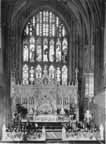
On Monday, May 14. 1917, the flag was carried to the steamship Saint Louis, which, at four o'clock in the afternoon weighed anchor and steamed down the Hudson, bound for Liverpool.
After reaching Liverpool, the flag was carried to London, where arrangements were made for it to be taken across the Channel on an English troop-ship, convoyed by destroyers and aeroplanes. After a night ride by train Paris was reached the morning of May 26th. On June 1st Arthur Kimber left Paris for Ligny en Barrois, to complete his mission and deliver to the First Stanford Ambulance Unit, then in service at the front, the first American flag to be unfurled on the battlefields of Europe with the official sanction of the United States Government after our entry into the war.
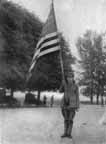
THE following letter from Arthur Kimber describes the presentation of the flag:
June 4th, 1917
What a relief! The flag has been presented! The presentation took place to-day, and I am going to tell you all about it. Last night, after dinner, Lieutenant Boudrez, in charge of our ambulance unit, informed me that the presentation would take place Monday morning (to-day) at nine o'clock.
I had a general idea of what I was going to say, but, not expecting that the presentation would come off until Wednesday or Thursday, I was not ready. I didn't go to bed till after 11 P.M. trying to think what I was going to say. For three hours I sat in Alan's ambulance, and finally turned in, .having got things in some shape.
The General of the division to which we are attached was not able to be present, for he had to go to the place that the Crown Prince has been so anxious to capture for the last three years, and where we are soon to follow. Colonel Colon was put in charge of the ceremony. Two French regiments were to be present. And right now let me say that never before has such an honor been conferred on any American force in France---not only to carry the First Official Flag, but to have had such a welcome from the French Army.
We got up at 6:20 this morning, and started to get ready to go to Tréveray, where the presentation was to take place. Two men left early to go to other towns for the standards of French regiments en repos there. They also took to the meeting place the French color-bearers and guards of honor.
Lieutenant Boudrez, Mr. Fishoff (who served as French-English interpreter), and I, in the staff car, left at 7:30 A.M. We were driven by a splendid French army chauffeur, who kept up a constant speed of thirty-five to forty miles an hour, around corners and through villages, and past all kinds of vehicles and obstructions. It was thrilling the way we skimmed by wagons, not missing them by more than an inch, and all at that devilish speed. The complete ambulance unit, crowded into five of the ambulances, followed us, but at a much less reckless speed. They were soon lost to view.
Our car arrived about eight o'clock. I met Colonel Colon, and through Fishoff received instructions as to how I was to proceed. (And when I got out on the field of review, I was mighty glad to have received instructions.) The field of review was on the top of a high hill overlooking the valley and village, and with a wonderful view in all directions. As we approached we could see company after company of French soldiers maneuvering into position. They all, wore the steel helmets and had the bayonets in place.
First the Colonel reviewed the troops by riding up and down in front of them. Then he took his place just in front, and I marched to position with a French guard of honor, and the staff officers and guards took their places in our rear. Right in front of them were Alan Nichols, "Doc" Speers (to be official color-bearer after the presentation), and Walter Snook. Nichols and Snook are now escorts to the colors. Behind them were the French flags and regimental standards, with their guards of honor, and behind them the band. The Stanford boys lined up in back of them. To either side were the two regiments and the two mounted officers.
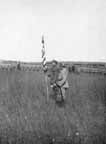
At a signal from the Colonel I started my speech. As far as I can remember it, it was as follows:
"Colonel Colon, Lieutenant Boudrez, Members of the First Stanford Unit of the American Ambulance Field Service, Soldiers of the French Army, and Other Persons present:
"A few days after war was declared between the United States and Germany, and the United States of America became one of the allies of France in this great world struggle which we are now witnessing, this flag was dedicated in California, to be carried to France as the official standard of the First Stanford Unit of the American Ambulance Field Service, and was presented to the Second Stanford Unit to be carried to the men already serving at the French front. These dedicatory services took place April 24, 1917, in San Francisco's new Civic Auditorium, with fifteen thousand persons present. It is the first American flag officially sanctioned by the United States Government to be carried in service at the French front.
"The Stanford men in whom this valuable confidence was placed felt it to be their duty to get the flag to the men at the front with the least possible delay and yet with the utmost surety. They tried to make arrangements to send the flag on ahead, but were met with disappointment. Finally, rather than wait too long, they selected me to bear the flag to France, and I assure you I deeply appreciated the honor bestowed upon me. I believe it is altogether fitting and proper upon this occasion for me to read you two letters which I was given upon leaving Palo Alto, April 27, 1917:"
"My instructions were to bring the flag as quickly as I could, and that I have done to the best of my ability. You all know the history of this flag: how it was dedicated and blessed in California; how it led a parade in New York down Fifth Avenue before thousands of persons, and how it was saluted and cheered by that vast multitude; how an attempt to capture it was frustrated; how it reposed in the chancel of Old Trinity Church and was there seen and prayed for by hundreds; and how it was carried through England on its way to France.
"Mr. A. Piatt Andrew was unable to make arrangements for public presentation in Paris, as the Friends of France had hoped, and he told me when I left that great city that he keenly regretted the fact that he would be unable to be here at its presentation today.
"Fellow-countrymen, I feel greatly honored to have been selected to carry this flag to you, and I assure you that it is with a very deep feeling of pride and relief that I complete my mission and hand the flag over to Colonel Colon, who will present it.
"My Colonel, here is the flag."

Immediately after finishing my speech, I handed the flag to the Colonel, and he made a very eloquent address, and presented the flag to Roland Speers, who is now the official flag-bearer.

Then the band struck up the "Star-Spangled Banner", and ended with the chorus of the "Marseillaise." (Before, while the troops were marching into position, they had played the "Marseillaise.") One of the Stanford boys afterwards told me that the Stanford men were just on the verge of crying, and that the tears came to his eyes during the ceremony, speeches, etc., but that when the band struck up our national air right in back of them shivers went down his body; and other men said they felt the same.
Just stop and think! It is the first time in the history of the world that French fighting troops have turned out in such an impressive review in war times to be present at the official presentation of an American flag to be carried at their own front. And just think that in five days the Croix de Guerre will be presented to the section, and pinned upon this beautiful flag, for our unit has been cited for its splendid work, and it has been officially announced that we have a Croix de Guerre coming. Hasn't Stanford a right to be proud?
The band struck up a lively march and led the review. When they reached a point opposite us, they drew up and halted, and played, while the rest went by in front of us to our right. First came the French colors, those not with us, and their escorts. Then our lieutenant, leading the Stanford men. They were followed by company after company of the French fighting men.
The whole presentation was great. It was a fitting climax to all that had preceded. And the Croix de Guerre, pinned on the FIRST UNITED STATES FLAG, will be the finishing touch. Oh, how I wish you could have been present! I can never forget it. It was much more than I had ever expected. By the way, the mayor of the town near which the presentation took place was there sketching the whole. He made an excellent drawing, and has promised to make me a copy.

Soldats de la Quatorzième Section de l'Ambulance Américaine: J'ai le très grand honneur de remettre entre les mains de votre porte-drapeau et de confier à votre garde le drapeau destiné à la S.S.U. 14 de l'Ambulance Américaine.
Ce drapeau, le premier qui a été envoyé en France par le Gouvernement des Etats-Unis, ne pouvait être confié en de meilleures mains.
Vous n'avez pas attendu, en effet, d'avoir au milieu de vous cet emblème sacré de votre grande patrie pour aider la France dans la grande lutte qu'elle doit soutenir avec ses Alliés contre la barbarie teutonne pour la sauvegarde de la civilisation, de la liberté, et des droits humains toujours foulés aux pieds par nos cruels ennemis.
Depuis longtemps, nous vous avons vus à l'œuvre remplissant en toutes circonstances avec un courage et un dévouement remarquables, votre noble mission vis-à-vis de nos blessés et de nos malades, et nombreux sont déjà vos compatriotes qui ont mêlé leur sang à celui des Français dans cette lutte gigantesque.
Il y a plus d'un siècle le drapeau français d'alors conduisit sur la terre Américaine une poignée de héros, qui avaient sacrifié d'avance leur vie, afin de vous aider dans votre lutte pour votre indépendance.
Aujourd'hui c'est toute la grande nation Américaine qui s'est levée à la voix de son illustre Président pour voler au secours de la France meurtrie et encore envahie.
Comme jadis notre union fera notre force, et bientôt vos couleurs et les nôtres unies à celles de nos Alliés fraternellement mêlées sur la champ de bataille, livreront le monde de la tyrannie allemande et assureront à tout jamais la victoire du droit, de la justice, et de la liberté. Aux Drapeaux!

Soldiers of the Fourteenth Section of the American Ambulance: I have the very great honor of placing in the hands of your color-bearer and of confiding to your keeping the flag destined for the Fourteenth Section Sanitaire of the American Ambulance.
This flag, the first to be sent to France by the Government of the United States, could not be placed in better hands.
You have not, in fact, expected to possess this sacred emblem of your great country, to aid France in the mighty struggle which, with her allies, she must wage against German barbarism, in order to safeguard civilization, liberty and the rights of mankind which are ever trodden under foot by our brutal enemies.
We have seen you at work for a long time discharging, always with courage and remarkable devotion, your noble mission among the wounded and the sick, and already there are many of your countrymen who have mingled their blood with that of Frenchmen in this gigantic struggle.
It is more than a century since the flag of France led a handful of heroes on American soil, who risked their lives in order to assist you in your struggle for independence.
And now the whole great American nation has risen at the call of your illustrious President to fly to the aid of France, stricken and still invaded.
As in former times, our union is our strength, and soon your colors and ours and those of our Allies, mingling in brotherhood on the battlefield, shall free the world from German tyranny and assure for all time the victory of right, of justice, and of liberty.
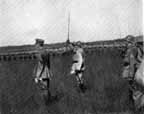
June 22, 1917
. . . . In the meantime a dead man was carried out on a stretcher. Both legs had been shot off, and he was a sorry sight. They put him in a dugout about fifty yards off, and sent for the coffin. During the night the Germans started a "tir de barrage" preliminary to an attack. It was wonderful. The French batteries replied and made a regular curtain of fire in back of us. A German incendiary shell hit a big pile of rockets and made the most glorious sight I have ever seen with fireworks. All during the night both sides sent up rockets, star shells, and red, white, and green lights. As morning broke, the hill was covered with smoke and dirt thrown up by the shells. The gunfire sounded like a tattoo, it was so fast and regular. The boys had never heard such a barrage fire before, yet the result gained was only a few trenches. If they did all that for such a little attack, what must the British offensive have sounded like!
Believe me, we were mighty glad when our twenty-four hours were over and we got back to Mourmelon to sit down and eat a nice warm meal which our cook had saved for us. We turned in immediately.

. . I was rudely awakened this morning, Friday, by a great commotion in camp. Motors were buzzing, and the Lieutenant was giving orders in a very excited way. The results of the German attack were just being felt, and wounded were pouring into the postes in large numbers. All the machines except the five which had just returned from duty were ordered out. That meant sixteen Ford ambulances tearing out into the darkness.
At dinner to-day we learned that one of the boys in Section 28, near us, had been killed by éclat that same night. They were serving further up the line. That has made us all serious. Believe me, when I get killed (I hope I won't) it won't be in the trenches, or driving an ambulance, but I will fall to the earth like a wounded eagle. But, cheer up, there is little danger in aviation. The war will soon be over. I am with you in spirit, if not in body, and am always thinking of you, and when we shall be together after the war. I dream of it at night, and think of it by day.
June 27th, 1917
. . . . We just saw a boche bring down a French sausage (captive observation balloon). The boche circled around above, and then fired incendiary shells. In a moment the balloon was in flames. A black speck dropped. It was the observer in his parachute. It opened and he floated to safety. The wreckage came down, making a big trail of smoke. A French plane 'way above the boche started to dive to catch him. He missed and shot 'way below. That gave the boche the advantage of height, and the French aviator wisely stayed away. The last we saw, the boche was beating it home. We just got back from Mourmelon-le-Grand, where they held the funeral of Paul Osborne. It was very impressive, and something I will never forget. We started about 8:05 A.M. Many of us rode in the camion, and we were just about jarred to pieces. As soon as we arrived at the old aviation parc, where there is an outdoor chapel, we all lined up in military order. Roland Speers carried the flag. Practically all the men in Section 28 were there, wearing steel casques. Altogether there must have been nearly 100 Americans present. Sections 12, 14, 19, 27, and 28 were well represented. There were also a large number of French. One armed squad was there and acted as a guard of honor. Brancardiers and stretcher-bearers carried the coffin. We all lined up in front of the chapel.
Mr. Osborne's brother, a member of the camion service, reached Mourmelon just a short time after his brother had a relapse and died. He stood out in front, and bore up bravely. After prayers had been read, one of the ambulances from Section 28 backed in, and the brancardiers lifted the coffin in. Then, slowly, with the hearse leading, the procession formed, and started to march toward the graveyard. This was right near the old aviation parc, and it was necessary to cross the field to get to it. Slowly we marched past the sheds of Henry Farman, then the Ecole Nieuport, and finally the Voisin hangars, then out into the field to the open grave. Several more prayers, and the body was lowered to rest. The whole was very, very impressive. Few of the men spoke until it was over. All were deeply affected.
Afterwards I shook hands with Osborne's brother. One of the men not in line had kindly taken some pictures for me with my camera. I told Osborne I would send some to him and his parents. We had our own flag to-day, and Paul Osborne was buried under his own colors.
July 6th, 1917
Wednesday, July 4th, 1917, just one month after the flag was officially presented, the General of the section pinned a Croix de Guerre on it, in token of the French Government's appreciation of the excellent services rendered by S. S. U. 14. Also, two of our members were honored with Croix de Guerre.
The day before, Mr. Muhr, in anticipation of the event, had us clean up the camp and give it as neat-looking an appearance as possible. We all worked hard, picking up papers and so forth, with French bayonets, just like New York park attendants.
The 3d had been terrifically hot; and, as is usual in the Chalons section, hot days are nearly always followed by violent rains, really precipitous. When we got up on the 4th, about 6:30, it was misty and humid, and all felt that rain was only a matter of minutes.
The French seem to have a way for setting the time for outdoor ceremony, etc., very early and then delaying a long time. We got into that awfully jouncing camion and arrived at the grounds about 8 A.M. It is bad enough riding on the front seat of a camion, but inside is a fright, for it bumps and bumps and bumps. Of course I couldn't take any pictures myself, but the new office assistant got some for me. Some of them were snapped in the rain, yet they came out all right.
At the word of command we all lined up in a single file and faced the troops who were being reviewed by the General. There were. many officers present, and nearly all had two or three medals on their chest. (Great sight! I wonder how they all got the medals!) The four companies were the soldiers responsible for the capture of Tête-Ton, in the Champagne.
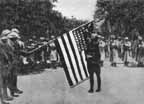
At a given signal, the color-guard, Nichols, Speers and Snook, went forward to the center of the hollow square, and after an eloquent address the General attached the Croix de Guerre to the flag.
Then Peter Fishoff's name was called, and he stepped forward to receive his Croix de Guerre. I was very glad to see him get it. He has been in the service two and a half years, and has worked faithfully all that time. He deserves his Croix de Guerre all right.
Right in the middle of the General's speech it started to rain. Beginning with a drizzle, it was not five minutes before it was a regular torrent. Everybody was drenched. The flag hung drooping and heavy. " Doc" said afterwards that as the rain increased in quantity and violence, he thought he could never hold the flag, the leverage was so great, and the pull grew greater. But of course, as is always the case, the rain stopped and the sun came out, just as the ceremony was completed.
In the afternoon the Médecin Divisionnaire presented Mr. Muhr with a Croix de Guerre for his faithful service since the American Ambulance was started. The Lieutenant tried to have us imitate the French soldiers. He reviewed us, made us form a hollow square, and then paraded the men in columns of four past the flag. It was quite enjoyable to blunder through the ceremony after the French style.
We had a regular Fourth of July spread. We waited an hour for Mr. Muhr. Operations commenced at 6:30. There were about ten courses, with wine and champagne. It was a real feast and a fitting climax to the day's festivities. Toasts were given to Mr. Muhr, the new man, the French officers, and the entire section. My! but it was great. And the whole took place in a barnyard, under a shed. But just think of a feast like that so near the firing line. The new section had relieved us the night of the 3d, so all our men were present, apart from those who left for Saloniki. As our cook was "en permission" we had a special cook for the occasion. After the banquet, everybody shook hands with Mr. Muhr and Fishoff, and seeing that all were "lit up," congratulations and good wishes and jokes flew thick and fast.
Out of the six films that Alan helped me to develop that night, I got thirty-two good pictures.
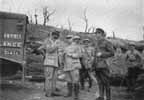
Paris, December 3d, 1917
Five of us got into Paris at eight o'clock last night, after a somewhat long, but interesting ride. I took advantage of my pass to leave camp early in the morning, to go to Tours for the last time, I imagine, for many months.
Just before the train left, I got my wings from the tailor. The U. S. wings are silvery white, with a shield in the middle, and a gold "U. S." on the shield. The whole is on a black mounting. They also gave me a plain gold-colored eagle in Paris to-day. This is fastened with a pin, but the wings are sewed on the coat just over the heart.
The flag is safe. Walt Malm is carrying it back to the United States and to Stanford.
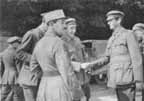
April 9th, 1918
Last night I had a chance to get a real touch of French peasant life, and I am very glad I took the opportunity presented to me.
At Issoudun I made a practice of taking my laundry to Madame ------, a kilometer or so from camp and past the growing American cemetery on the hill. To-night I went after it, as I expected to be ordered to the front in a day or so. The weather was quite snappy as I strolled up to the little village, and my hands were red with the cold. Madame with true hospitality insisted that I enter and sit by the fire for a few moments. I consented, not knowing of course that there was no fire, but that they were going to build one especially for my benefit.
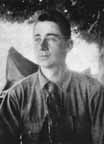
Like most French farmhouses, the house had its front door on the barnyard. The barnyard was like an enclosed court, for the barn and sheds and outhouses and house were all built under one roof and formed a hollow square with an opening on one side where there might have been a gate.
I had to duck my head to keep from bumping it as I entered the door. This was of heavy oak, the planks fastened together by huge iron bolts and the whole suspended on tremendous iron hinges. It had a great big old-fashioned lock that I'll wager you couldn't break with a crowbar, and there were chains and bolts inside to hold the door shut at night. The tile floor of the rooms within was lower than the ground level of the barnyard.
I first stepped into the little entry hall, but only had time to observe that two bedrooms sprang from it before Madame grabbed me by the arm and shoved me through another door. Again I had to duck to prevent fracture of the skull, into a fairly large room which evidently served every purpose under the sun.
La grandmère had heard her daughter speak of the fire and had hastily lit some brush which was on the hearth. Madame literally hit a wicker chair against my legs in back of my knees and I simply fell into it. The flames leaped up. My chill left me, for what with the fire and the rousing cheer the whole family was giving me, how could I do else than warm within as well as without? So I simply adapted myself to circumstances, stretched my gawky legs toward the hearth, and decided to stay awhile.
Slowly I collected my thoughts and made observations. What a cheery place and how different from what I had imagined. Grandma had left the room as I sat down, so at the moment there were only two of us in the room, mama and myself. She was busy brushing up and seemingly everywhere at once in her hustle. She was also gathering my laundry together and making it into a nice compact bundle. Her major operations were being conducted on a big table in back of me which practically blocked one end of the room ---that end with the windows looking out on the barnyard; but there was just room enough at the ends of this table to walk around and take position on the long stone window seat which served in place of a long row of chairs and on which were thrown clothes in the process of being mended, a basket containing a sewing outfit and threads, and a brand-new pair of wooden shoes. There were no window curtains, but outside there were heavy wooden shutters, solid and built just like the door.
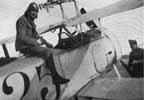
At the other end of this living-room was a regular old-fashioned French bed, high, and with a great fluffy mattress and soft quilts. A chair stood at the head, and was evidently indispensable when it came to getting into bed at night. This bed, like the table and window seat, was loaded with freshly washed clothes (American)---Madame does a big laundry business, je pense. Over all was a huge canopy and curtains that made me think that Marie Antoinette or Catherine de Medici must have stopped there.
The brush on the hearth was not supposed to burn long, and at this moment, Grandmère, a stooping, bent-double old creature dressed in black and hobbling along, clack-clackity-clack-clack-clack in her wooden shoes, entered with a great bundle of sticks. Her hands were withered and bony, her face was wrinkled---she was all shriveled up and looked eighty-five at least. But then Frenchwomen age quickly, 'And I don't suppose she was over sixty-five or seventy. I was reminded of that woman in the pastello picture "Before the Storm" that Pap got in France long ago.
She threw her load down with a crash that scared the cat which was under the hearth. The hearth was about eight inches above the floor and there was an opening below for making a draft or something, and this had been occupied by the cat, a fact of which I was unaware. As pussy scampered out under the legs of my chair I jumped and nearly lost my balance.
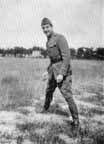
And just then Georgette came rushing in breathless from the shop down the road where she had been to buy some chocolate. I had seen Georgette before and thought her nothing wonderful, but to-day she was dressed in her holiday clothes, for she and her cousin Claire had been a promenading right before dinner. She seemed very attractive and had a winning smile. She seemed in such a rush that I asked her, "Pourquoi si vite, Georgette, ma chérie? "---"Claire m'attends." ---"Alors, allez et trouvez Claire, et venez ici ensemble, et nous nous parlerons une heure, n'est pas, Madame?" from me, and a delightfully rich red blush from Georgette, who rushed off as quickly as she had come in.
Within five minutes she was back with Claire. We all drew our chairs before the now roaring blaze. As a last job before sitting down, la grandmère lifted the cover of the huge cauldron hanging over the fire and supported by a huge chain from the mantel (just to see if the water was boiling, I suppose), and then she too sat down and we talked.
I cannot remember what we talked of. The conversation was naturally light and simple because it was in French and I had difficulty in holding my own in that tongue. They asked me all sorts of questions about aeroplanes and flying and what it felt like. I told them some of my experiences in France and all about my machine. They admired my uniform and Sam Browne belt and little bars, and my wings. They said they were greatly honored to have a lieutenant sit at their hearth and talk with them. They were very sincere in this, I could see it clearly. Oh, these peasant people are so simple and frank and good-hearted and generous! They are only ignorant.
Eight o'clock came, then nine o'clock. It was getting late, but I didn't want to leave. I was having a fine time talking with these people, and was thoroughly enjoying myself Even in their little hovel with their simple life, they could be happy. Le père était au front. He came back every four months, but he was over forty-five, so was in back of the lines and not in the trenches.
Finally I had to shake myself loose. I paid for my laundry, picked it up under my arm, shook hands with the whole crowd, promised to drop Georgette a card from the front (which promise I honestly intend to carry out if I don't forget it), bid them all au revoir, bonne chance, et bonne nuit, and ducking my head again as I went out, to avoid a crash, I plunged into the cold and darkness.
Twenty minutes along the uneven road, when a sharp "Halt! Who goes there?" rang out in the still night air. "A lieutenant returning from the village with his laundry," I replied. "It is late for laundry." (I wonder just what he was thinking as he said this.) It was obvious I wasn't drunk, as most late arrivals are. There was a slight sarcasm in his voice as he blurted out the word "laundry," but I had the huge and awkward bundle of evidence under my left arm.
"Advance and be recognized, Lieutenant." I stepped forward a few paces. "All right, sir; pass on." And he brought his rifle to a "present arms" while my right hand shot up to my hat rim in an answering salute.
What if I had been a private or a cadet or a German prisoner? The first would have gotten a good lecture punctuated by curses (for a soldier standing lone guard at night always likes to let out his pent-up wicked words) and would then have passed with a "Good-night," or "Good luck," or "So long, pal." The third would have been shot. The cadet would have been driven to the guardhouse at the point of the bayonet. Lucky I was a lieutenant.
Well, the evening is over; I am tired now and was then. I repeat the au revoir, bonne chance, et bonne nuit. And also lots of love to you dear Mother, John, and George. God bless and keep you!
May 4th, 1918
The new art gallery at Stanford must be fine. I would have liked to be at that Memorial Church service. Some of the boys in the Section thought that the flag would be put in the Museum, but I felt sure it would go in the Memorial Church.
June 15th, 1918
Just as I am on the eve of departure for the front, I see an article in the New York Herald, Paris edition, that Alan has died of wounds. I went up to headquarters to find out about him, for I heard he had been shot down in the French lines, and they said he was severely wounded in the back, abdomen and leg. I can't make myself believe the paper. I'm going to headquarters now to see if it is true.
Poor, brave Alan. No words of mine can do him justice. I mourn him, not so much because of his being, as I believe, my best friend, but because of what he was---the man---the hero. He was always there, ever ready to volunteer, never complaining when he got the raw end of a deal. Constantly cheerful and always pure, noble, good, with high ideals and standards which he had the strength to live up to. He saw his duty in this war, and he hesitated not one whit. Although serving and fighting with the French armies, he died for our Cause, and for his country, the United States . . . . .
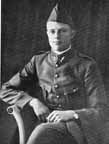
It is true. Poor old Nick. My best friend---gone. I spent this afternoon walking in the Bois de Boulogne to compose myself, selecting the quieter and less frequented part of the park. Monday I go to join a French escadrille, and I am to have a Spad machine. What more could I wish! Look out, Fritz!
Alan had two boches officially, besides several unofficial. He had been cited twice, and proposed for the Médaille Militaire, but he died before it could be granted. As soon as his second citation arrives, with his Croix de Guerre and two palms, the Captain is going to give them to me to send to his folks by registered mail.
Alan's loss is felt by everybody in the escadrille, from mechanics up. He was loved and admired by all his comrades. Never before have I heard so many good words for any man.
Sept. 15, 1918
It has always been my policy to be perfectly frank with you and tell you everything. If anything should happen to me you would be glad to know of all my experiences. This is war and war is in itself dangerous; everybody knows that.
Yesterday I had the most thrilling experience in my life. Now I am going to tell you all about it, but don't allow yourselves to worry; it will do no good. We chasse pilots run many risks daily and they are all in the game.
On the anniversary of my enlisting in the U. S. aviation, I had the biggest fight of my life---September 14, 1917. I joined up in Paris. Little did I dream then what a chasse pilot goes through; now I know. Yesterday I found out. But in addition I learned something that I am very glad to know ---I don't wilter under gun fire nor do I lose my head in even an unequal fight with bullets shrieking and whistling all around me hitting my plane, "Nick," and just missing my head. That is one satisfaction.
Yesterday afternoon eight of us started on a patrol with the Captain leading. Our mission was to create a safe zone for our observation planes five kilometers ahead of our advancing forces, and to do this we had to fly 8-9 kilometers north of our most advanced lines. Because of my having had a little more experience than some of the boys I was placed on the left and to bring up the tail and cover the others. Rear man has the worst position in case the patrol is attacked for he is the first victim picked upon, and in case his patrol attacks he gets little glory, for it is the leading men who shoot at the enemy first.
So when the nine Fokkers attacked us six, Little and I were the first victims. About four of the red-nosed blue-bodied machines jumped on me. They had height and were in the sun and all I could do was to wriggle. At that moment 1 looked below and saw that five or six other Fokkers had come up and were attacking the rest of the patrol. In a dogfight like that it soon develops into each man for himself and the devil take the hindmost. Well I was the hindmost, but at the same time I didn't like the idea of being easy meat for the devil huns. We were about 5200 meters high and 10 kilometers in the boche lines.
I watched my tail like a cat and saw the enemy come on. One especially attracted my attention and he was only about 75 meters off. He moved prettily and I moved like mad to get out of his sights. But he wasn't my only worry, for there were three or four picking on me alone. No sooner would I avoid one than another was firing at me. Rat-tat-tat-tat! What a sound! And then a streak of pale sickly whitish blue smoke would whish by over my head as the bullets flew by. I'll bet a hundred bullets came within six inches of my body. Nick was absolutely riddled; I didn't even have a chance to fire a shot. I had to look in back of me all the time, and with me I don't like to fire unless my beads are on the other man's head. There is no use firing bullets wildly if they are not going to hit something. This is not a Fourth of July celebration just for noise, sparks and smoke; and yet through it all I never thought so quickly or so clearly in my life. My head was just as cool as could be. It was a game to outwit the huns and get away.
With motor racing full speed I swung into a fast steep right-hand spiral dive; going down almost vertically and yet turning enough to keep the other fellow's sights off me. Really, to tell the truth, I've never seen such a pretty sight as those tracers and incendiary bullets flying past leaving their trail of smoke; but that smoke smells awful. The rat-tat-tat-tat is bad, but the whistle and crack as the bullets hit home in your machine, ripping the fabric and breaking the woodwork, is awful.
For 1200 meters those streaks and bullets kept flying past me; then the boche seemed to pull out of their following dives, evidently convinced that they had sent a Spad down out of control. I let Nick dive vertically for another 800 meters just for good luck and then gently pulled him out toward our lines. Looking up and back I saw the huns circling around like hawks over their prey. In the air was considerable wreckage; evidently a plane had exploded. As I crossed the lines the boche kept archying me with their black archies, but I couldn't help laughing---their shots went so wild. My altitude then was about 3000 meters. That 2200 meters was the fastest I've ever dropped.

Giving Nick the once over I decided it was best to make for our aerodrome and land. My landing was terrible and bouncy, because among other things the boche had shot off my left tire. As I taxied up to the hangars a great crowd of pilots and mechanics gathered round my plane and of course they had to have the story and congratulate me upon getting away. Nick and I certainly were lucky; there's no question about that.
My machine was so badly shot up that I'll probably have to have a new one. The motor was untouched, so I am going to ask the Captain if I can't have that in my new plane. There were nearly 70 holes in my machine, mostly in the fuselage and body. The three vital parts---my engine, the gas tank, and I---were untouched, although bullets smashed some struts and wires not three inches from me. The rudder-control wires were nearly cut in two, ditto one aileron control and the left flying cables. The tail was nearly shot off, the rudder was perforated, and the left lower wing was a wreck---with the longérons nearly cut away. Three struts in the fuselage were smashed and many wires were severed; the propeller had two holes in it.

Well, it will be my turn next time, and I certainly do hope to have better luck with the hun than he had with me. Gee, but I wanted to go right up again after a boche! But this is no game for the single hunter and the man who flies alone in an offensive is a fool; the hun flies in formations of fifteen to twenty. No, my chance will come and I hope it won't be in a dogfight but in a duel. I went up this morning in another fellow's machine, but it developed motor trouble, so I had to land; but I have all my nerve and I've smelt a lot of powder; I'm a wiser and more experienced pilot.
God was merciful to me; I hope I can prove myself worthy of His mercy in this war and in later life. Well I must quit; good-bye, good luck and lots of it and much love. God bless you all.
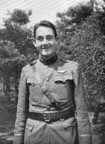
I am quoting below a report on the late Lieutenant Kimber by the commanding officer of the squadron in which he met his death in line of duty:
"Arthur C. Kimber, of the 22d Aero Squadron, who was killed in action September 26th, 1918, stands out markedly as one of the bravest American aviators that fought in this war. Even before he came to join the 2d Pursuit Group at Toul in August, he had an enviable record among Americans serving in France with the Ambulance Corps, and while attached to a French escadrille before joining an American squadron.
"With the 22d he was quietly eager and aggressive, disregarding personal advantage; most willing to do anything that pertained to his line of duty . . . . .
"On September 14th he was a member of a patrol of six which was pounced upon by a score of Fokkers. From the fierce struggle following, Lieutenant Hassinger failed to return, and Lieutenants Brooks and Kimber were in desperate straits, almost shot down while both were well shot up. Although by good rights the plane might well have been replaced, it had too much of a grip on Arthur Kimber's affections, for he went immediately to work to replace the damage by the Hun bullets, and continued to fly the same Number 12 (Nick No. III, insignia, the Shooting Star).
"On the 26th of September he set out on a patrol with his squadron. The pursuit planes were equipped with two light bombs. The mission was to strafe roads between Grandpré and Dun-sur-Meuse. One group, led by Captain Bridgman, went down to 200 meters near St.-Juvin, and scattered a collection of boche. Another group of three, led by Lieutenant Kimber, went to the region of Romagne. Lieutenant Kimber dived toward the railroad station. His machine suddenly blew to bits. It is of course unknown whether the shells of artillery from either side, or a bullet from the ground into the bombs, caused the tragedy . . . . "
He was a remarkable pilot; a strong adherent to the requirements of his duty; an outstanding type of American Air Service Officer.
For the C. A. S.
E. C. WHITEHEAD
Colonel A. S., Chief of Staff
February 18, 1920.
I am interested to learn that the first American flag to go officially to the battlefields of Europe after our entry into the war has found its permanent resting place beside the altar of the chapel of Stanford University, from whence its unit started. The Croix de Guerre pinned to its folds typifies the successful termination of the career of high-souled adventure of its guardians.
As one of the officials of the Department, and as one of the citizens of the country in whose service Lieutenant Kimber met his death, I share your grief that the hands which carried this banner eastward across the ocean might not have brought it back. The Croix, with the flag, will stand as the most fitting memorial to those of its brave bearers who did not return.
Cordially yours,
(Signed) NEWTON D. BAKER.
An ardent believer in the ideals of democracy and peace, and willing, if need be, to give his life for them, Arthur Clifford Kimber left the United States in May, 1917, as advance member of the Second Ambulance Unit of Stanford University. On this trip he carried with him an American flag, presented by the "Friends of France" to the First Stanford Ambulance Unit, already in service at the front. The details of the presentation on the battlefield are vividly recounted in these pages.
The character of this young man was typical of the best in America. Wise, resourceful, and resolute, yet at the same time gentle and idealistic. It was my fortune to know him well as a student, and to recognize his noble qualities.
That war insistently devours such men as Clifford Kimber is its final indictment at the bar of civilization.
DAVID STARR JORDAN.
Stanford University is very proud of its sons who gave an early answer to the great call that came to us from Europe. Particularly is this true regarding the ambulance units sent from the University to France before the official entrance of the United States into the war. It will be hard to duplicate in character and initiative these small but ardent groups of men. The incident of the flag described in this little book is symbolic of the spirit, the enthusiasm, and the wholesome youth of the men who so nobly represented Stanford on the other side. We take pride in the splendid record of Arthur Kimber, both in life and in death. We think of him as a high example of the type we take pride in calling the "Stanford Man."
RAY LYMAN WILBUR.
The American Field Service, from the time of its inception at the beginning of the war, stood squarely for the cause of France. During the years when this country maintained perfect neutrality, its ambulances were actually serving at the battle-front. As its efforts became more widely known, contributions and volunteers flowed to France in steadily increasing numbers, proving that the loyal and intelligent citizens of the Nation had accepted the Great Cause.
This volunteer work, permitting immediate action at the front, appealed particularly to the youth of the Nation, whose vigor and idealism, fostered by fine training in truly American homes, impelled them to take up the active burden of service and sacrifice.
Among the foremost of these was Arthur C. Kimber, who volunteered as a member of the Second Stanford University Unit. To his care was entrusted an American flag, presented to the First Stanford Unit, then serving in France. This flag was accepted by the War Department, as one of the Nation's official standards. It was the first American flag officially carried to the front. As the bearer of this distinguished trust he may well have been anxious to see it unfurled in France without loss of time, and soon after his arrival in Paris he had the satisfaction of being sent out with it to Section 14. where the flag was received and officially recognized by the French Army at a splendid review and consecration.
When the Field Service was taken over by the United States Army, Arthur Kimber decided to enlist in aviation, and trained as a chasse pilot. This ambition he later realized, and during the heat of the great battles over the fields of France, in the summer of 1918, he was doing his share of the work as a fighting scout. It was while he was so flying, and after a record of splendid achievement, that he was killed within the German lines, September 26, 1918, at about half past eleven in the morning.
His death is equally mingled with tragedy and glory. It is the eternal epic of high-spirited and patriotic youth. The finest blood of a nation is always ready to give the fullest sacrifice. Those who are willing and fit to give the most to life are also willing to give the most to death. Though little may be said to lessen the tragedy of his loss, or to add to the glory of his death, it seems worth while to record a few of the words spoken by General Baratier, at the grave of Paul Osborne, killed in our service at the front, in 1917:
"My thoughts go out to your parents, who, over there on the other side of the ocean, will learn of the sorrow which has stricken them. I know that words have no power to lessen a mother's sorrow, but I know, too, that the thoughts of the ideal which she inspired in the heart of her son will be able, if not to dry her tears, at least to transform them. For it is through these tears, the tears of all mothers, of all women, that VICTORY will come---that VICTORY which will assure the peace of the world, and which will be theirs more than any others', since they have paid for it with their hearts.
"Soldier, sleep on, in the midst of your French comrades, fallen, like you, in glory; sleep on beneath the folds of the flag of the United States, in the shade of the flag of France."
With the same spirit that gave utterance to this stirring and tender tribute, will the memory of Arthur Kimber be guarded by his comrades and compatriots.
HENRY D. SLEEPER.
[This poem was written upon the death of one of several comrades and warm friends. Each of that group in turn has "crossed the threshold." Dan Asa Bigelow was killed in June, Gilbert Jerome was killed in July, Arthur Kimber in September, and James D. Beane in October, 1918.]
|
It cannot be, I say it cannot be. It cannot be, I say it cannot be It cannot be. I say it cannot be. |